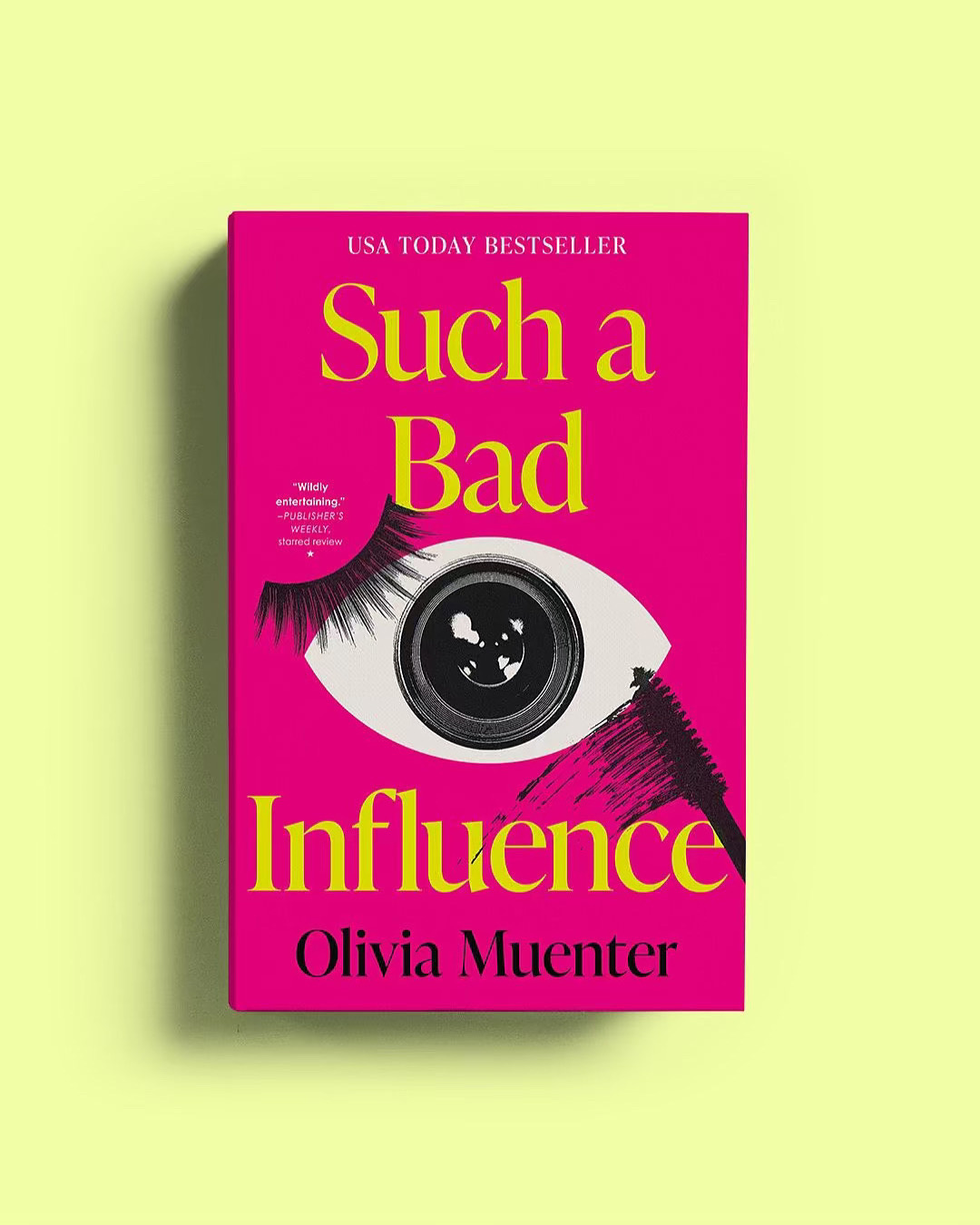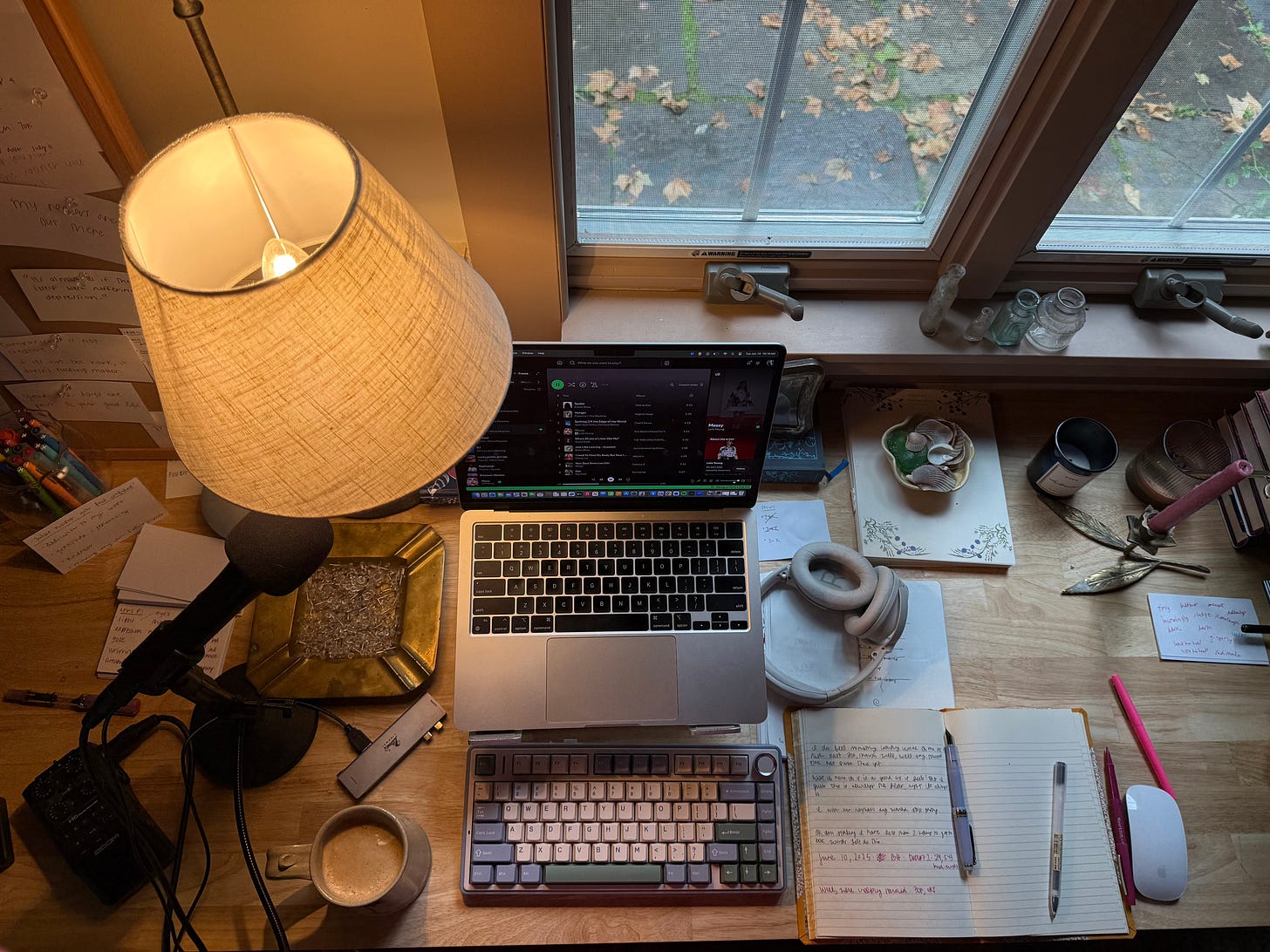One year of being an author.
Some things I've learned.
Pro tip: Check out to the audio version to hear me talk through this entire post while you’re driving, walking, doing dishes, or procrastinating on your own writing (relatable). This one is podcast episode-length.
What I cover here today: A paperback announcement, one year as an author, and everything I’ve learned about staying happy, sane, and grateful along the way.
Hi, friends. I come to you from my office, which is freshly outfitted with a loud, glorious window air conditioning unit. It is crispy cold and buzzing with white noise in here. Winnie is sleeping on the ottoman behind me, curled up into a little ball. I feel great.
Earlier this month, I finally got to announce the new paperback cover1 for my first novel Such a Bad Influence. The paperback is out on December 9, and I am thrilled it gets to have one more summer as a hardcover before it gets to live a whole new life as its paperback self.
I posted the paperback announcement on June 4, the one year anniversary of SABI being out in the world. That day feels about as far away as I can imagine now, both because I can still recall my 2022 self thinking about how very far away 2024 felt and because I feel like a very different person than I was a year ago.
Publishing my first novel changed my life, and not because I am now swimming in cash or something (I still make less than I did when I was influencing) but because it became impossible for me to ignore how much I love this. There is nothing else I would rather do. The funny part is that the longer I work as an author, the more I realize how difficult publishing can be. It’s hard to get published, to make a livable income, to keep going, to build an audience, to feel good about yourself, to stay in your lane, to find your readers, to get better… all of it! Hard! And so much of it, solitary. And yet, that’s my big dream. I know that now. I don’t feel entitled to it being a reality forever (I know exactly how rare that is now), but I do feel a responsibility to name it and work toward it.
I hesitated to write this sort of reflective post because I am still learning. I’ve been doing this (more or less) full-time2 for, what, a year? Who am I to give advice? But this isn’t really an advice newsletter as much as it is dispatches from the emotional frontlines of putting a book into the world. It is scary as hell and emotionally challenging in every way. There are some things I’ve learned that help me keep going anyway. Maybe they’ll help you too.
Here are 9 things I’ve learned since becoming an author.
Psst: If you’re interested in even more nitty-gritty publishing stuff, I did a pub month post-mortem last year, one month after pub, for paid subscribers.
The thing that you think will validate you will not.
I wrote about this in my announcement for Little One, but if I could tattoo this on my own forehead, I would. I can’t even tell you the amount of times I have thought that something was about to make me sit back and relax into believing myself and then it… simply did not do that. I have thought: If I make a bestseller list, I’m good. If I earn out, I’m good. If I go to auction, I’m good. If my book sells for six figures, I’m good. If it gets foreign deals, if it becomes a TV show or movie, if it is a book club pick, if it has a rock solid Goodreads rating, starred trade reviews, a sold-out tour, if there is buzz3.
I’ve had some of these things and I’ve dreamt about (and obsessed over) others. The funny thing is that the accolades I do have very quickly fizzle into nothing more than total flukes (ask me how many times I’ve wondered if I somehow tricked or fooled my editor/publishers into buying my books), while the ones I do not have tell me everything I need to know about my skill and potential as an author, or lack there of. At least, this is how it feels in my own head. And no, it doesn’t make sense.
I have to remind myself every single day that I do this because I love it. That my readers are out there. And that there is nothing that will more efficiently fuel me to sit down at my computer and write every day than the fact that I love the work. Once I accepted that the things I expect to validate me will not, I learned that my motivation has to be internal.
Comparison is inevitable. Being crushed by it is not.
Publishing is a notoriously opaque industry. It’s confusing (more on that in a bit). It’s slow. This means that one of the easiest things to do is compare yourself to someone else in order to chart the sustainability of your own career. In the moment, it really does sometimes feel like the surest way to confirm that you are successful or valued. To know if your next book will sell, or it won’t. To figure out whether your publisher is happy with you, or they’re not.
I can’t even name the times I’ve held my career against someone else’s and tried to count the small differences, convinced that my career was in OK shape or (more often) completely doomed. I did it this morning. I’ll probably do it again tonight. I think this is inevitable. I’ve learned it doesn’t have to be overwhelming.
I like to think of myself as on a long, beautiful solo hike where every so often, I wander off course, straight toward comparison. There’s always the option to turn around and reset, aim toward gratitude instead, and just focus on the work. I do it probably a few times a day. It works for me.
Reading matters as much as writing.
There is nothing that has improved my writing or, frankly, my life, more. Reading every day is as much a part of my work routine as writing is. It’s as much a part of my mental health care as exercise or therapy. It’s essential to who I am.
Since publishing my first book, I have become much better at paying close attention to the things I read and love. The books that make me swoon. I tried to think of another word but swoon is the best description I can think of for when I love a book. I notice the small things. I feel swept up, airy, in awe. It’s all I want to think about. I’ve gotten better at asking: What was it about that sentence? That character? That scene? I love this hobby. It is the best thing.
When I read books (especially in my own genre) that make me envious, I try to reframe it as something to work toward. They used to panic me but in a weird way, they excite me now. I want to get better, better, better. Reading makes me better, as a writer and a human.
The book you’re writing right now is probably (hopefully?) not the best thing you will ever write.
While I was publishing SABI, I was also eyeballs-deep in revising what would become Little One. Most of that time, I just kept working on LO and thinking, “This is so good! This is all I want to talk about!” Now that I’m in the final stages of editing Little One, and actively drafting Book 3, I’ll give you a wild guess about how I’m feeling. Even though I’ve polished Little One within an inch of its life and Book 3 is currently littered with notes like “make this less cheesy, I beg of you,” I still think Book 34 is the better of the two.
Partially, this is probably just because it’s new and shiny and I’ve not yet drafted myself into an unfixable plot problem (in time, I’m sure). I’m also at the stage with LO where I feel pretty sick of staring at the same sentences week after week, month after month. But it’s also that I can feel and see improvements in my skill as a writer as I draft this new book. I make different choices than I would have made even six months ago. It doesn’t mean I’m not proud of Little One; I am! Very much so! What it does mean is that my brain focuses on creation more than perception. Once a book is off to copy edits, it’s done. I could fixate on things I’d change or do differently or how it will be received (and I do that sometimes, too, of course), but I’d rather focus on building a new story and improving my craft.
You must find your people.
For me, talking to other writers is what makes writing and publishing books manageable. But I have also learned that it’s important to recognize the types of relationships that make me feel seen, supported, and grateful, and which produce the opposite feelings. Publishing, like most industries, is rampant with gossip and competition. I like to yap as much as the next person, and in the moment, gossiping can feel a lot like connection, but I think we all know those conversations that we leave and immediately regret. Not because they’re malicious or mean-spirited, necessarily, but because deep down, we know that the aim to find us validation through the criticism of others, in one way or another. I probably don’t need to tell you that this rarely works.
And yes, there is something glorious about a gossip-soaked dinner that spans for hours, learning new tidbits about your industry (especially in a career that can feel as isolating as writing books), but these are also not the types of conversations that help me keep writing. In fact, I usually leave them questioning something about my own work more than I was before. More on that later.
I’m so thankful to have found a small handful of people who I can check in with regularly and trust to be encouraging and supportive (with some lighthearted gossip sprinkled in there too, of course). It’s made every impossible thing feel manageable.
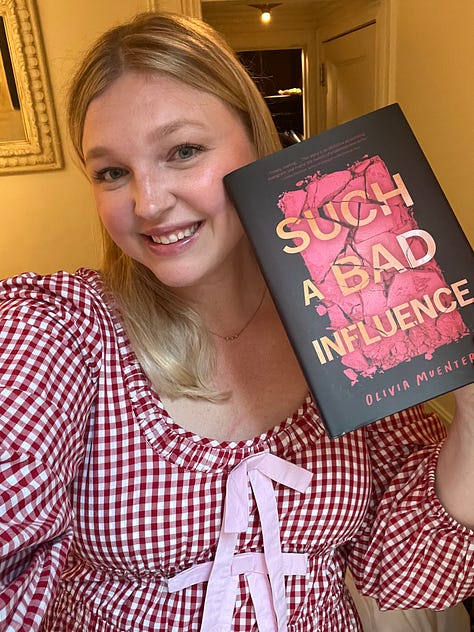
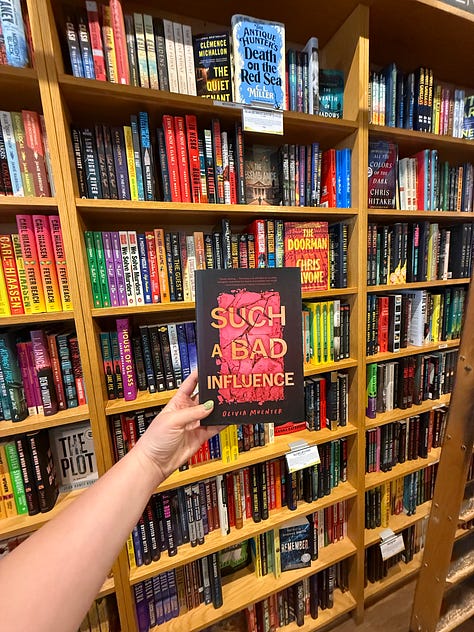
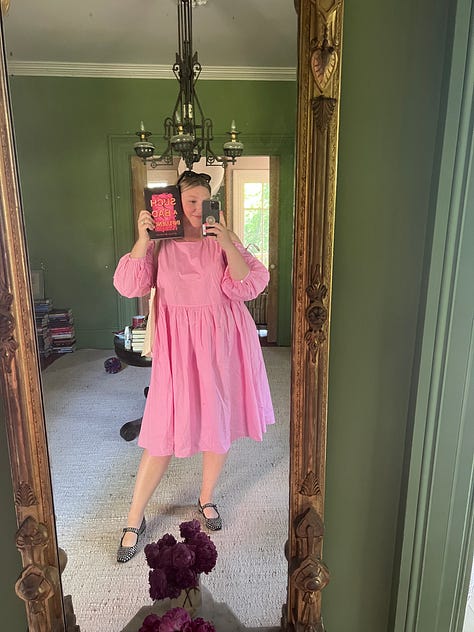
No one in your life will understand publishing. You probably won’t even understand publishing.
I am fairly certain that my mother will confuse my agent and my editor and ask me, “Wait, what’s an imprint again?” until the end of time. I know now that anytime I tell anyone the timeline for a book and explain how glacially slow things go, they will stare at me in bewilderment. I know that people who are not writers don’t understand the intensity of a cover reveal or a dream blurb or going on submission. I don’t blame anyone for this. It’s all confusing. I’m still learning things.
Sometimes, this can be frustrating, but I’ve learned that the feeling is actually a little more rooted in loneliness. It’s tough to talk to people about the ins and outs of an industry they don’t understand and certainly don’t care about as much as you do. This is why the previous point has been so important to me. Having people you can go to and say, “Is this normal?” or “What does this single sentence in an email mean?” is key. I don’t think anyone ever actually has the right answers, but that’s not really the point.
I still talk to all of my closest non-writer friends and family about work, but I never expect them to completely follow each and every up and down. I’m mostly just grateful they’re still listening.
Patience may not be possible, but writing is.
I’ve learned that a lot of publishing comes down to waiting. Waiting for an email. An offer. A rejection. Revisions. A cover design. A blurb. I refresh my email probably 50 times a day. Maybe more. I am almost always waiting for something that feels very, very important. I am almost always always analyzing the wait itself. What does it mean that it’s taken this long? Am I doomed? Is it all over? Then the email comes and I relax for a second before I realize that there is something else I’m waiting for now.
Once, while waiting for notes back on a big revision, I decided that my book was probably getting cancelled. It was the only thing that made sense, I told myself. It was getting cancelled because they realized I had fooled them into thinking I was a good writer, and they were just figuring out how to tell me. This makes no sense, yet when you are waiting, these are the things you imagine. Or maybe that’s just me.
I would say that I’ve learned to be patient but that is not true. What I have learned to do is to keep writing. If I am waiting, I am writing. I journal every day, often about the waiting itself and my subsequent spiraling and most days, I am also working on a draft of something. No matter what happens next, I know I am benefitted by spending the wait bringing a new book to life.
Right now, that means writing 4,000-ish words a week in between copy edits and proof pages and blurb emails and all the other late-stage things in the publishing process. It is an escape that requires exactly zero waiting.
There must always be two books in my head. Or maybe three.
The above point is why, for me, it’s key to always have two or three books in my head: The one that is being polished, the one that is being drafted, and the one that is percolating. The third is usually an idea that comes out of nowhere and then sticks around and grows. I don’t write anything about it for weeks or months or years, but the idea stays in my head anyway. A long time from now when I need to move on to another book, it will already be half-formed in my head. I’ll be chomping at the bit to write the first sentence. This is the goal, at least.
What makes me feel smaller, what makes me feel bigger.
If there is one lesson I’ve learned in the last year that’s more important than all the rest, it is knowing what makes me feel smaller, and what makes me feel bigger. I’ve learned the hard way, and continue to learn, that there are behaviors and habits that make me feel expansive and creative and happy and there are those that make me feel small and nervous and stuck.
In today’s bonus content for paid subscribers, I’m sharing a breakdown of what makes me feel small in my writing life, and what makes me feel big.


